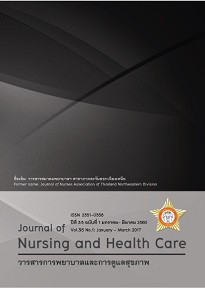พฤติกรรมส่งเสริมสุขภาพของผู้ติดเชื้อเอชไอวี/ ผู้ป่วยเอดส์ที่ได้รับการรักษา ด้วยยาต้านไวรัสเอชไอวีสูตรดื้อยา Health - Promoting Behaviors of HIV/ AIDS Patients Receiving Second - Line Antiretroviral Therapy
คำสำคัญ:
พฤติกรรมส่งเสริมสุขภาพ ผู้ติดเชื้อเอชไอวี/ ผู้ป่วยเอดส์ ยาต้านไวรัสเอชไอวีสูตรดื้อยา Health - Promoting Behaviors, HIV/ AIDS Patients, Second - Line Antiretroviral Therapyบทคัดย่อ
บทคัดย่อ
การวิจัยเชิงพรรณนา เพื่อศึกษาพฤติกรรมส่งเสริมสุขภาพของผู้ติดเชื้อเอชไอวี/ผู้ป่วยเอดส์ที่ได้รับการรักษาด้วยยาต้านไวรัสเอชไอวีสูตรดื้อยา เก็บข้อมูลระหว่างเดือนกันยายนถึงพฤศจิกายน พ.ศ.2558 กลุ่มตัวอย่างเลือกแบบเจาะจง จำนวน 54 คน เป็นผู้ติดเชื้อเอชไอวี/ผู้ป่วยเอดส์ที่ได้รับการรักษาด้วยยาต้านไวรัสเอชไอวีสูตรดื้อยาโรงพยาบาลขอนแก่นเครื่องมือคือแบบสัมภาษณ์พฤติกรรมสุขภาพผู้ติดเชื้อเอชไอวี/ผู้ป่วยเอดส์ที่รับยาต้านไวรัสเอชไอวี ซึ่งมีค่าสัมประสิทธ์ความเชื่อมั่นทั้งฉบับเท่ากับ 0.91 วิเคราะห์ข้อมูลโดยใช้วิธีแจกแจงความถี่ หาค่าเฉลี่ย ร้อยละ ส่วนเบี่ยงแบนมาตรฐาน
ผลการศึกษา พบว่า กลุ่มตัวอย่างมีพฤติกรรมส่งเสริมสุขภาพโดยรวมอยู่ในระดับดี (=2.79, S.D.=0.30) โดยมีพฤติกรรมส่งเสริมสุขภาพรายด้านอยู่ในระดับดี 5 ด้าน ได้แก่ 1) ความรับผิดชอบต่อภาวะสุขภาพขณะได้รับยาต้านไวรัสเอชไอวี (=3.12, S.D.=0.28); 2)การพัฒนาจิตวิญญาณ (=3.02, S.D.=0.43); 3) การจัดการความเครียด (=3.00, S.D.=0.43); 4) การมีกิจกรรมและการออกกำลังกาย (=2.60, S.D.=0.42); 5) โภชนาการ (=2.59, S.D.=0.40) แต่มีพฤติกรรมส่งเสริมสุขภาพรายด้านอยู่ในระดับพอใช้ 1 ด้าน คือ การมีสัมพันธภาพระหว่างบุคคล (=2.41, S.D.=0.52)
พฤติกรรมส่งเสริมสุขภาพของผู้ติดเชื้อเอชไอวีที่รับการรักษาด้วยยาต้านไวรัสเอชไอวีสูตรดื้อยาโดยภาพรวมและรายด้านส่วนใหญ่จะอยู่ในระดับที่ดี แต่พฤติกรรมส่งเสริมสุขภาพโดยเฉพาะอย่างยิ่งด้านการมีสัมพันธภาพระหว่างบุคคลอยู่ในระดับพอใช้และยังคงพบพฤติกรรมการป้องกันการแพร่กระจายเชื้อไม่เหมาะสมซึ่งควรสนับสนุนให้ผู้ติดเชื้อเอชไอวีที่ดื้อยามีพฤติกรรมที่เหมาะสมต่อไป
Abstract
This is a descriptive research study for health-promoting behaviors of HIV/AIDS patients receiving second-line antiretroviral therapy. Research was carried out from September to November 2015. Data was collected to show behavioural health for54 HIV/AIDS patients receiving second-line antiretroviral therapy in KhonKaen Hospital. The Health Behaviors for Receiving Antiretroviral Therapy Scale (HBARTS) was used as the instrument and tested for reliability using Cronbach’s alpha coefficient that yielded a result of 0.91. Frequency, percentage, standard deviation and t-test statistic were used for the analysis of data.
The study revealed that the participants had a high level of health promoting behavior (=2.79, S.D.=0.30; range of score 1-4). Five aspects were used for scoring health promoting behaviors. According to score, the behavior was ranked as follows; 1) Health promoting behavior of health responsibility (=3.12, S.D.=0.28), 2) Health promoting behavior of spiritual growth (=3.02, S.D.=0.43), 3) Health promoting behavior of stress management (=3.00, S.D.=0.43), 4) Health promoting behavior of physical activities (=2.60, S.D.=0.42), 5) health promoting behavior of nutrition (=2.59, S.D.=0.40). There was also one mid-level behavior which was the behavior of interpersonal relations (=2.41, S.D.=0.52).
Health promoting behaviors of HIV/AIDS patients receiving second-line antiretroviral therapy were generally at a good level. However, details of each aspect reflected that more should be done to promote healthy habits, especially the behavior of interpersonal relations as well as preventing HIV transmission. It is very important in planning to promote health behaviors in HIV/AIDS patients receiving second-line antiretroviral therapy and also equally to support them by promoting healthy lifestyle behaviors.



